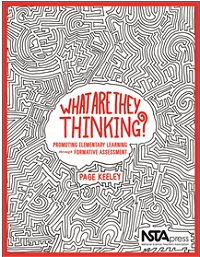What Are They Thinking? Wouldn’t You Like to Know?
By Carole Hayward
Posted on 2014-06-06
 A day in the life of a young child could be described as one big scientific experiment with its limitless opportunities for exploration of the natural world. Because these daily experiences are started in infancy, elementary students bring their preconceptions with them, which can impact how they think and process new information.
A day in the life of a young child could be described as one big scientific experiment with its limitless opportunities for exploration of the natural world. Because these daily experiences are started in infancy, elementary students bring their preconceptions with them, which can impact how they think and process new information.
Now more than ever formative assessment is a critical tool in helping elementary science teachers uncover these student preconceptions and understand what they may be thinking at any point during an instructional cycle.
Bestselling NSTA Press® author Page Keeley understands that elementary teachers represent an important “first line of offense in addressing common misconceptions that follow students from elementary grades into middle school, into high school and even into adulthood.” That’s why her new book supports elementary science teachers’ capacity to continuously, seamlessly use formative assessment.
What Are They Thinking? Promoting Elementary Learning Through Formative Assessment is organized into 30 chapters, each featuring an article written for Science and Children’s monthly column, “Formative Assessment Probes: Promoting Learning Through Assessment.”
Each article was specifically written to illustrate how a probe (a two-tiered assessment specifically designed to reveal common misconceptions), often combined with a FACT (formative assessment classroom technique), can be used in a K-6 classroom. Each chapter includes a Reflection and Study Guide to help educators reflect on what they learned after reading the chapter. Keeley is well known for her research-based probes that are aligned with grade band expectations, easy to implement, and proven effective. The topics included span a wide-range of subject matter (from “Birthday candles” to “Pushes and Pulls” to “Catching a Cold” to “Were Did the Water Come From?”)
Whether you’re a teacher, teacher leader, mentor, science specialist, professional development provider, or preservice instructor, there is something for each of you in this book, in improving and supporting the teaching and learning of elementary students by embedding formative assessment into daily instruction.
This book is also available as an e-book.
Disclaimer: The views expressed in this blog post are those of the author(s) and do not necessarily reflect the official position of the National Science Teaching Association (NSTA).

